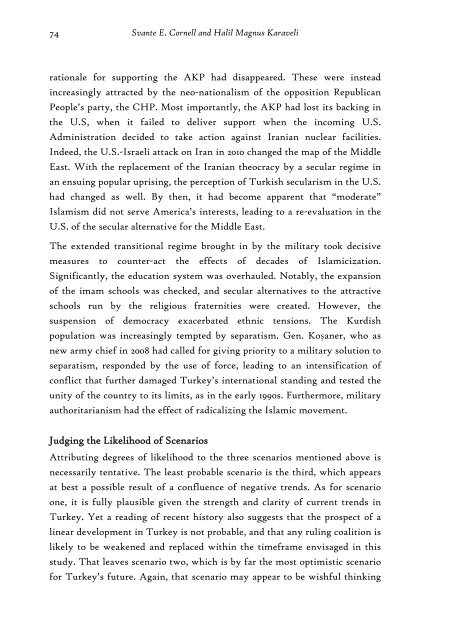2008_10_SRP_CornellKaraveli_Turkey
2008_10_SRP_CornellKaraveli_Turkey
2008_10_SRP_CornellKaraveli_Turkey
Create successful ePaper yourself
Turn your PDF publications into a flip-book with our unique Google optimized e-Paper software.
74<br />
Svante E. Cornell and Halil Magnus Karaveli<br />
rationale for supporting the AKP had disappeared. These were instead<br />
increasingly attracted by the neo-nationalism of the opposition Republican<br />
People’s party, the CHP. Most importantly, the AKP had lost its backing in<br />
the U.S, when it failed to deliver support when the incoming U.S.<br />
Administration decided to take action against Iranian nuclear facilities.<br />
Indeed, the U.S.-Israeli attack on Iran in 20<strong>10</strong> changed the map of the Middle<br />
East. With the replacement of the Iranian theocracy by a secular regime in<br />
an ensuing popular uprising, the perception of Turkish secularism in the U.S.<br />
had changed as well. By then, it had become apparent that “moderate”<br />
Islamism did not serve America’s interests, leading to a re-evaluation in the<br />
U.S. of the secular alternative for the Middle East.<br />
The extended transitional regime brought in by the military took decisive<br />
measures to counter-act the effects of decades of Islamicization.<br />
Significantly, the education system was overhauled. Notably, the expansion<br />
of the imam schools was checked, and secular alternatives to the attractive<br />
schools run by the religious fraternities were created. However, the<br />
suspension of democracy exacerbated ethnic tensions. The Kurdish<br />
population was increasingly tempted by separatism. Gen. Koşaner, who as<br />
new army chief in <strong>2008</strong> had called for giving priority to a military solution to<br />
separatism, responded by the use of force, leading to an intensification of<br />
conflict that further damaged <strong>Turkey</strong>’s international standing and tested the<br />
unity of the country to its limits, as in the early 1990s. Furthermore, military<br />
authoritarianism had the effect of radicalizing the Islamic movement.<br />
Judging the Likelihood of Scenarios<br />
Attributing degrees of likelihood to the three scenarios mentioned above is<br />
necessarily tentative. The least probable scenario is the third, which appears<br />
at best a possible result of a confluence of negative trends. As for scenario<br />
one, it is fully plausible given the strength and clarity of current trends in<br />
<strong>Turkey</strong>. Yet a reading of recent history also suggests that the prospect of a<br />
linear development in <strong>Turkey</strong> is not probable, and that any ruling coalition is<br />
likely to be weakened and replaced within the timeframe envisaged in this<br />
study. That leaves scenario two, which is by far the most optimistic scenario<br />
for <strong>Turkey</strong>’s future. Again, that scenario may appear to be wishful thinking


